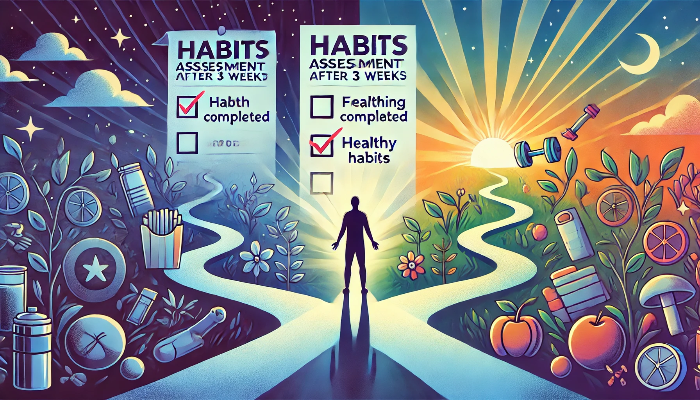오늘의 문장

습관 형성의 첫 단계는 3주 동안 꾸준히 특정 행동을 반복하는 것입니다.
그러나 습관 형성은 여기서 끝나지 않습니다.
3주의 기간이 끝난 후에는 그 습관이 얼마나 자연스럽게 일상에 녹아들었는지를 평가하는 과정이 필요합니다.
새로운 습관을 계속 추가하기보다는 이미 형성된 습관을 유지하고 강화하는 데 집중하는 것이 더 효과적입니다.
많은 사람들이 동시에 너무 많은 습관을 시도하다가 스트레스를 받거나 지속하지 못하는 경우가 많습니다.
그렇기 때문에 3주 동안 꾸준히 수행한 습관이 무엇인지, 간헐적으로 실행했던 습관이 무엇인지 명확히 구분하는 것이 중요합니다.
이 평가 과정은 실제로 어떤 습관이 당신의 삶에 자리 잡았는지 이해하는 데 도움을 줍니다.
또한, 3주 동안 테스트한 습관이 자동적으로 실행되는지를 살펴보는 것도 필요합니다.
이를 통해 무리한 시도를 줄이고, 기존의 긍정적인 습관을 공고히 다지며 지속 가능성을 높일 수 있습니다.
습관 형성과 유지는 단순한 반복이 아니라, 자신을 이해하고 꾸준히 평가하며 성장하는 과정입니다.
전체 글 보러 가기
습관의 힘. 작은 행동이 만드는 큰 변화
습관은 우리 삶을 조각하는 보이지 않는 손과 같습니다.하루를 시작하는 아침의 루틴부터 무의식적으로 선택하는 행동 하나까지, 습관은 우리의 일상과 결과를 좌우합니다.특히 새로운 해를 맞
wisdom.vistatu.com
난이도 1
번역
The first step to forming a habit is to repeat a certain action for three weeks.
But forming a habit doesn’t stop there.
After three weeks, you need to check how naturally the habit fits into your daily life.
Instead of adding new habits, it’s better to focus on keeping and improving the habits you already started.
Many people try to start too many habits at once and feel stressed or give up.
That’s why it’s important to know which habits you did regularly and which ones you didn’t.
This helps you understand which habits have become part of your life.
You should also check if the habits you tested during the three weeks are automatic now.
By doing this, you can reduce stress and make your good habits stronger and more lasting.
Forming and keeping habits is not just repeating actions, but understanding yourself and growing over time.
주요 단어
1) repeat : To do something again and again.
(ex. She will repeat the song until she learns it.)
2) habit : Something you do often and automatically.
(ex. Eating breakfast every day is a healthy habit.)
3) important : Very necessary or valuable.
(ex. It is important to drink water every day.)
난이도 2
번역
The first step in habit formation is consistently repeating a specific behavior for three weeks.
However, habit formation doesn’t end there.
After the three weeks, it’s necessary to evaluate how well the habit has blended into your daily routine.
Instead of constantly adding new habits, it’s more effective to focus on maintaining and strengthening the ones you’ve already established.
Many people attempt to develop too many habits at once, leading to stress or failure.
Therefore, it’s crucial to clearly distinguish between habits you practiced regularly and those you did occasionally.
This evaluation process helps you identify which habits have truly taken root in your life.
It’s also important to assess whether the habits you practiced during the three weeks now feel automatic.
By doing so, you can reduce unnecessary efforts, solidify positive habits, and improve their sustainability.
Habit formation and maintenance are not just about repetition but involve self-reflection, evaluation, and growth.
주요 단어
1) evaluate : To judge or assess something.
(ex. Teachers evaluate students’ work to give them feedback.)
2) routine : A set of actions you do regularly.
(ex. Her morning routine includes exercise and breakfast.)
3) effective : Producing the result you want.
(ex. Studying every day is an effective way to prepare for exams.)
난이도 3
번역
The initial phase of habit formation involves consistently repeating a specific action over a three-week period.
However, the process of establishing habits extends beyond this timeframe.
After three weeks, it’s essential to assess how seamlessly the habit integrates into your daily routine.
Rather than continually introducing new habits, it’s more productive to prioritize maintaining and reinforcing those that are already established.
Attempting to cultivate multiple habits simultaneously often results in stress or lack of sustainability.
Hence, it’s vital to differentiate between habits you performed consistently and those you executed sporadically.
This evaluation process enables you to recognize which habits have become ingrained in your life.
Additionally, it’s important to determine whether the habits practiced during the three weeks have transitioned into automatic behaviors.
This approach minimizes excessive effort, fortifies existing positive habits, and enhances their long-term viability.
Habit formation and sustenance are not merely acts of repetition but encompass self-awareness, regular evaluation, and personal development.
주요 단어
1) integrate : To combine or fit something into a whole.
(ex. She wants to integrate exercise into her daily routine.)
2) sustainability : The ability to continue something for a long time.
(ex. Sustainability is important for creating long-term habits.)
3) productive: Useful or achieving a lot.
(ex. A productive study session includes taking short breaks.)
'자기계발' 카테고리의 다른 글
| 코딩 자격증 & 국비 지원 : 개발자로 성장하는 법 (0) | 2025.03.03 |
|---|---|
| [자기계발 + 영어공부] 작은 행동의 반복으로 좋은 습관을 만들어라 (0) | 2025.01.19 |
| [자기계발 + 영어공부] 나쁜 습관은 버리고 좋은 습관을 시작하자. (1) | 2025.01.19 |
| [자기계발 + 영어공부] 습관 기르기. 작은 행동이 만드는 큰 변화 (1) | 2025.01.14 |




댓글